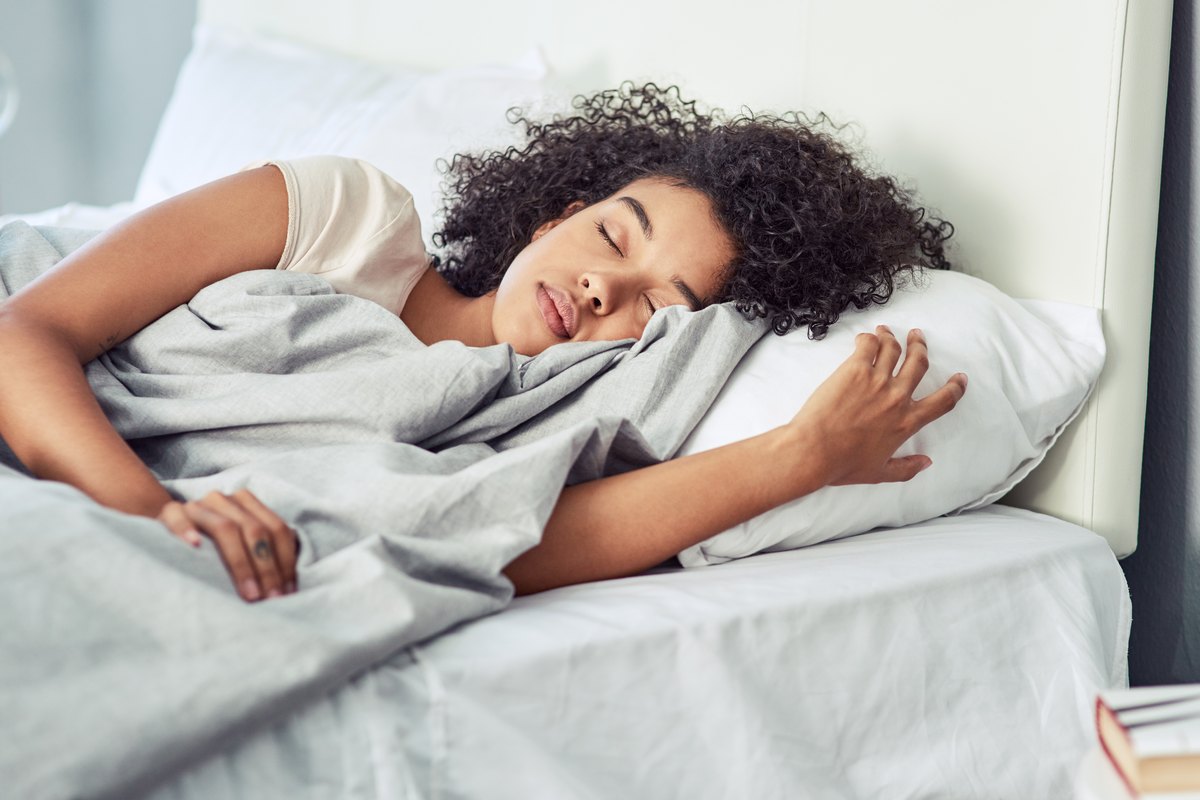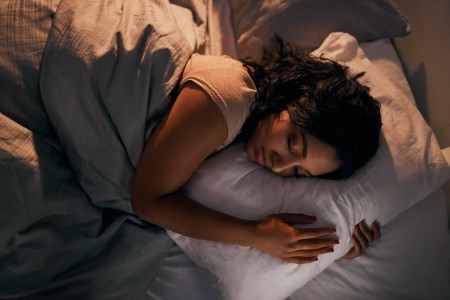
Advertisements
Ahh, deep sleep. It's what you call a night of solid, uninterrupted rest — but it's also a specific stage of sleep that your body needs to rest and repair itself. And when you're not getting enough, you'll feel the effects pretty quickly.
Video of the Day
Here's a look at what exactly deep sleep is, how it helps you feel your best and how to increase your deep sleep.
First, What Is Deep Sleep?
Deep sleep is a stage of non-REM sleep where the body experiences no eye movement or muscle activity. "It is when our brain shows the slowest wave activity," explains Nicole Avena, PhD, associate professor of neuroscience at the Icahn School of Medicine at Mount Sinai in New York.
It's harder for a person to wake up during periods of deep sleep, and if you are roused, it's normal to feel groggy or even disoriented for a few minutes.
The body goes through several cycles of deep sleep throughout the night, but the longest one happens shortly after nodding off, with deep sleep periods shortening as it gets closer to the morning, according to the Cleveland Clinic.
Why Do We Need Deep Sleep?
Deep sleep plays a key role in helping the body recover from stress and daily activity. During this stage of sleep, "our blood pressure is low and steady, making it easier for our bodies to repair physically and mentally," Avena explains. You also need deep sleep to keep your immune system strong, per November 2021 findings in Communications Biology.
Your brain relies on deep sleep too — it plays a key role in processing and consolidating your memories, Avena says.
What's more, you need it to wake up feeling energized and refreshed in the morning. "Without deep sleep, brain fog and loss of concentration throughout the day are typical," Avena says.
How Much Deep Sleep Should We Be Getting?
Between 13 and 23 percent of your sleep should be deep sleep, according to the National Center for Biotechnology Information. That's one to two hours if you're logging the recommended seven to nine hours of total shut-eye per night.
Measuring the amount of deep sleep you get by the hour isn't necessarily so important. (It's also not easy to do. More on that later.) "A good way to measure if you're getting enough deep sleep is if you can wake up after about eight hours of sleep without an alarm, feeling awake and ready for your day," Avena says.
In other words? If you're getting enough total sleep to feel refreshed, your deep sleep needs are being met.
Advertisements
How to Get More Deep Sleep Naturally

Feeling tired during the day or needing a lot of caffeine to get through it all are signs you're not getting the total sleep you need, per the Centers for Disease Control and Prevention (CDC). And if you're falling short on total sleep, chances are your deep sleep is lacking too. Here are some strategies for getting closer to your nightly quota.
1. Go to Bed Earlier
Are you staying up so late that it's impossible to log an adequate amount of sleep? Most adults need 7 or more hours of sleep per night, per the Mayo Clinic. If your current bedtime is cutting into the time when you should be snoozing, your first step is to start turning in earlier.
Try setting an alarm (pushing it 15 minutes earlier each night, as needed) for the time you want to be in bed, to help you stick with it.
2. Practice Good Sleep Hygiene
Start adopting habits that up your chances for falling asleep quickly and staying asleep. The CDC recommends you:
- Be consistent with your bedtime and wake time
- Keep your bedroom dark and quiet
- Set the thermostat at a comfortable temperature
- Keep electronic devices like tablets and smartphones out of your bedroom
- Turn off the TV
"By stopping screen time two hours prior to bedtime, you can rest your eyes and head before falling asleep," Avena says. (Try using the time for relaxing activities like taking a warm bath or reading instead.)
3. Get Some Exercise
Moving more during the day can help you sleep more soundly at night in general. And exercising late in the day — about an hour and a half before bedtime — has actually been shown to improve deep sleep in particular, per a March 2017 review in Advances in Preventive Medicine.
4. Watch Your Caffeine and Alcohol
Both can lead to worse quality sleep. Caffeine can stimulate the brain and make it harder to fall asleep when consumed within six hours of bedtime, per November 2013 findings in the Journal of Clinical Sleep Medicine. And while alcohol may help you doze off more easily, it can lead to sleep disruptions that make it harder to sleep deeply, the Cleveland Clinic notes.
5. Try Melatonin
If lifestyle habits aren't enough, talk with your doctor about taking a melatonin supplement. "The hormone melatonin is produced by the brain before entering the first stage of sleep, but sometimes our brains need an extra kick to get into deep sleep faster and stay there longer," Avena says. She recommends taking a supplement one to two hours before bed.
How to Track Deep Sleep
Sleep trackers including watches, wearables and bedside sensors can give you a good sense of how much sleep you're logging overall and whether your sleep is disrupted throughout the night. Some claim to measure individual stages of sleep — including deep sleep — but the information is really just a guesstimate, according to the Mayo Clinic. Only a clinical sleep study measuring your brain waves can tell for sure how much of your sleep is deep sleep.
That said, having a sense of how much sleep you're getting in general can be helpful. Remember, if you're sleeping enough in total, you're likely getting the amount of deep sleep you need, Avena says.
Just keep in mind that a tracker can only tell you how much you're sleeping — simply using one won't improve your sleep. If a tracker shows you're falling short on your nightly shut-eye, it's up to you to make the changes necessary to get more sleep.
What Happens When You Don't Get Enough Deep Sleep
If you're not getting enough deep sleep, chances are you're not getting enough sleep total.
Some signs of a lack of deep sleep include:
- Feeling tired or irritable during the day
- Trouble concentrating
- Over time, you might also notice that you feel depressed or have trouble remembering things, per the NCBI
- Lack of sleep can also increase your risk for chronic diseases in the long term, including type 2 diabetes, heart disease, obesity and depression, per the CDC






